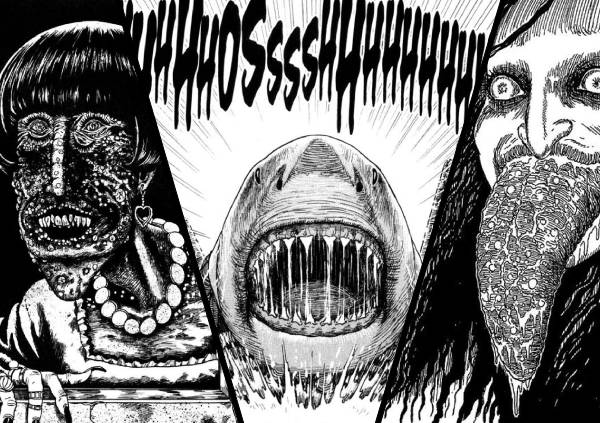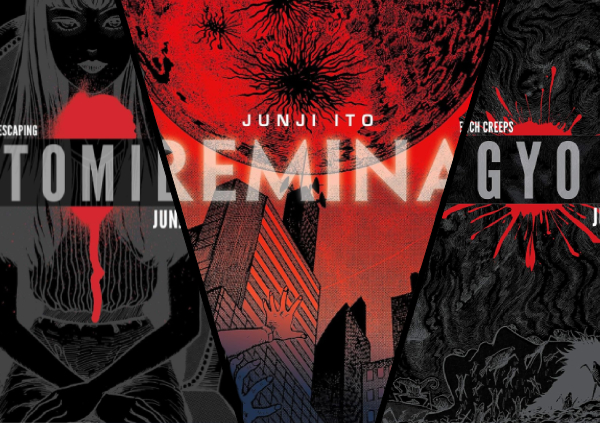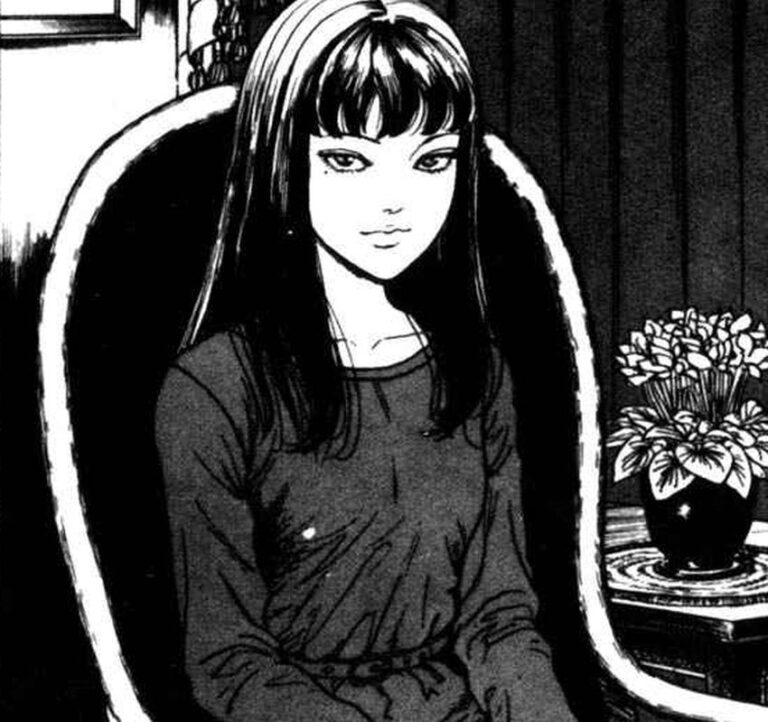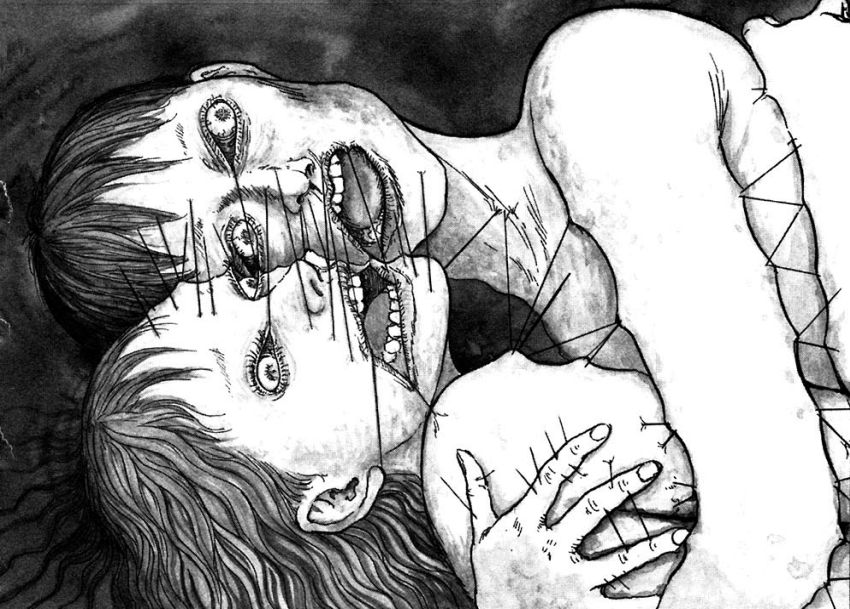
Army of One stands out as one of Junji Ito’s most underappreciated masterpieces. It was originally published as a bonus story alongside Hellstar Remina, but, in my opinion, it completely overshadows it.
It’s a blend of psychological horror, societal commentary and existential dread. Even more interesting, it offers a reversal of one of horror’s most classic rules: safety in numbers.
Plot Overview – A City in Stitches
The story follows Michio, a young man and loner by nature, who bears witness to a chilling phenomenon unfolding first in his city, and eventually all over Japan.
It begins with two bodies found stitched together in a public place. At first, people dismiss it as an isolated incident and a cruel act of murder.
Before long, however, things escalate, and soon groups of three, four, even dozens of corpses are found stitched together as grotesque displays. Even stranger, the victims show no signs of struggle or resistance, almost as if they willingly succumbed to whoever is responsible. Soon enough, panic grips the nation.
In most popular horror stories, you survive by sticking together. Yet in Army of One, this concept is flipped. Gathering in groups is a death sentence, and only those who isolate themselves are safe.
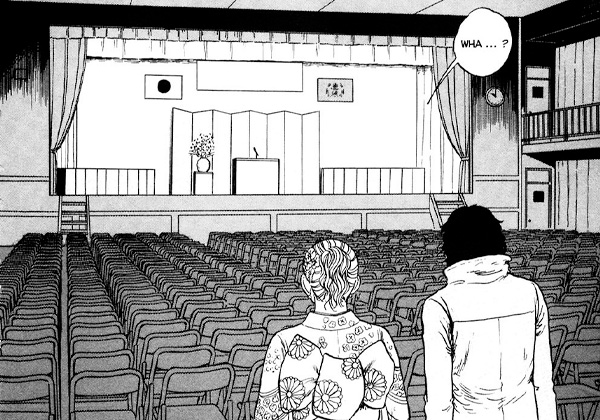
What Makes Army of One so Good?
The brilliance of Army of One lies in how it not only distorts but weaponized one of our fundamental human instincts, the need for social connection, and turns it deadly.
Once again, Junji Ito masterfully escalates the horror. Early murders feel plausible, but when the body count grows, and corpses are found as part of massive, sprawling displays, the story shifts from a serial killer thriller to one of surreal, existential horror.
As the story continues, we witness a gradual breakdown of society. Public events are cancelled, people isolate themselves from society, and even mutual trust all but dissolves.
Ito captures this descent by employing his usual stark black-and-white style. It’s clean, simplistic, but increasingly claustrophobic.
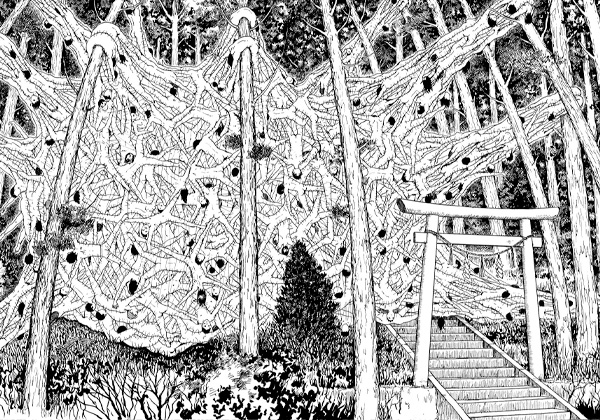
Another highlight of the story is its ambiguity, and the fear of the unknown. We never find out who’s behind the killings. All we learn about is an enigmatic group named ‘Army of One,’ which seems to always have dropped fliers before the killings. Yet, how can a single group, however big, be responsible for murders on a nation-wide scale. This uncertainty deeps the horror, and it invites the question about what’s truly happening. Is it mass hysteria, collective violence, or the work of supernatural forces?
Deeper Interpretations – Isolation, Hikikomori, and Toxic Group Pressure
Beyond its surface, Army of One can be interpreted as a criticism of modern Japanese society, particularly the tension between individuality and collectivism.
Anyone familiar with Japanese society knows about the role of conformity. Toxic group pressure, especially in working environments, is common. Looking at Army of One through this lens, one can see parallels. Joining into this culture of collectivism, into these groups, leads to the erosion or even death of individualism.
Another point of interest is the Hikikomori phenomenon in Japan. Starting during the late 1990s and 2000s, more and more young people isolated themselves from society, and instead, spend their days inside their rooms.
Looking at Michio, one can see the parallels. The reason for his survival is the choice to withdraw from an oppressive, toxic, and ultimately fatal society.
At a deeper existential level, Army of One also portrays the collapse of communal bonds. There’s a rising fear that contact with anyone, even friends and family, can spell doom. This, in turn, entirely erodes human connections, and in a world without trust, survival demands nothing but loneliness and isolation.
Final Verdict – An Underappreciated Horror Masterpiece
Army of One is one of Junji Ito’s most chilling and intellectual stories. It perfectly combines visceral horror with social commentary, creating a story that feels both real, but also strangely important.
If you’re a fan of horror that goes deeper than just scares and gore, Army of One is an absolute must-read.
It’s a story about the dangers of modern society, toxic group pressure and conformity, all shown via a display of surreal horror.
Want to dive deeper into Ito’s work? I covered The Enigma of Amigara Fault in detail here.
You can find Army of One as a bonus story in Hellstar Remina, available on Amazon.

